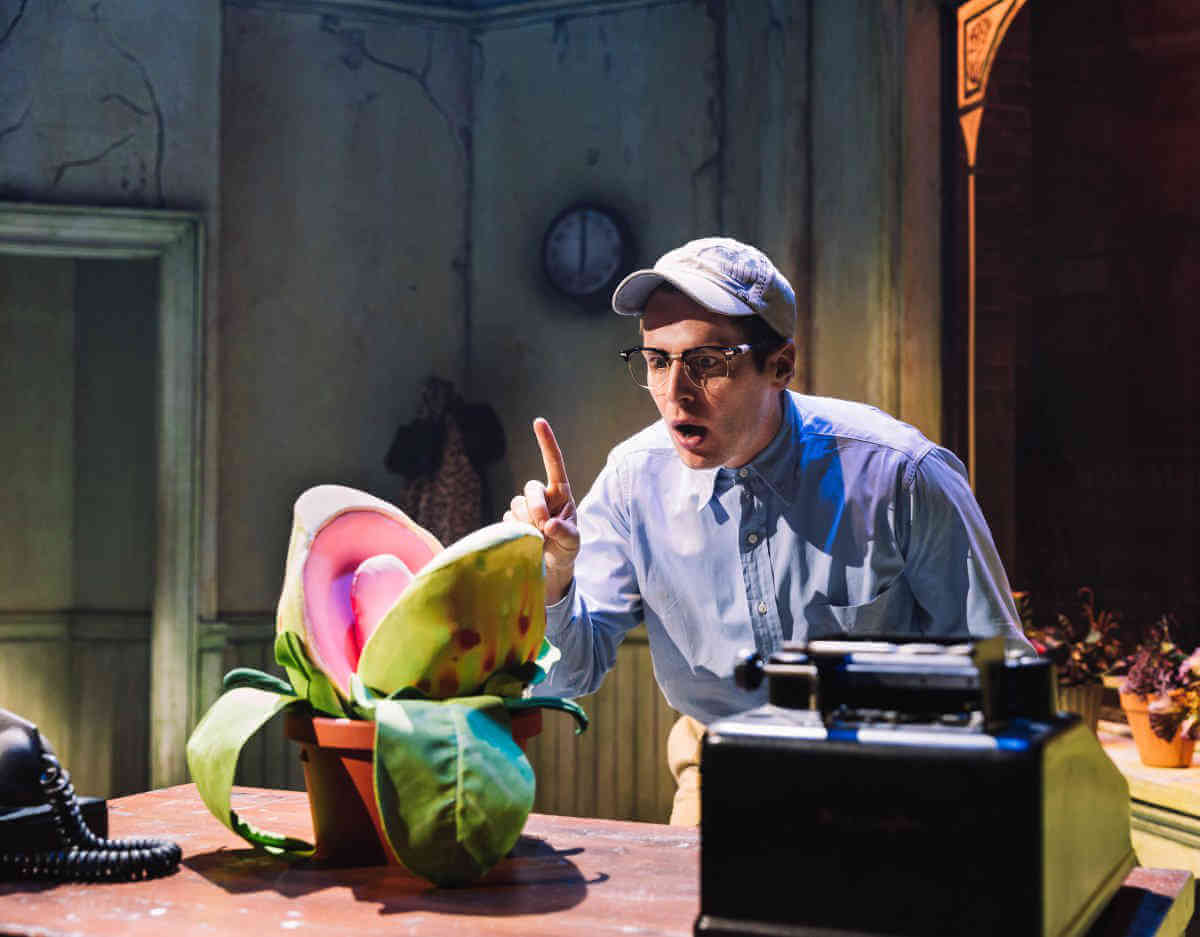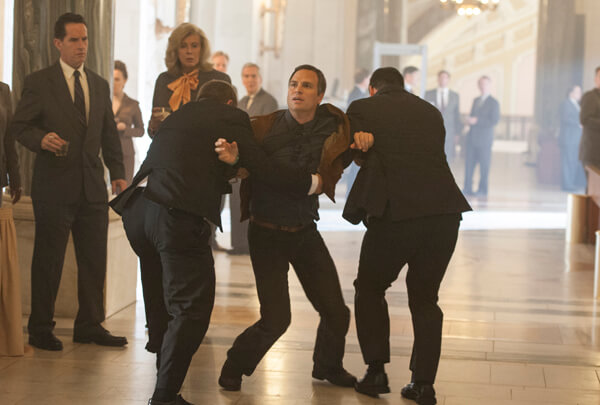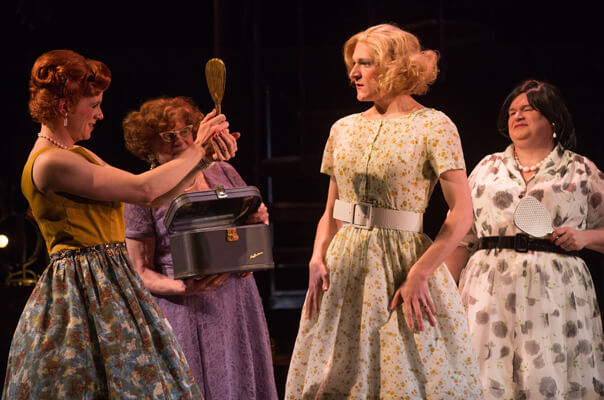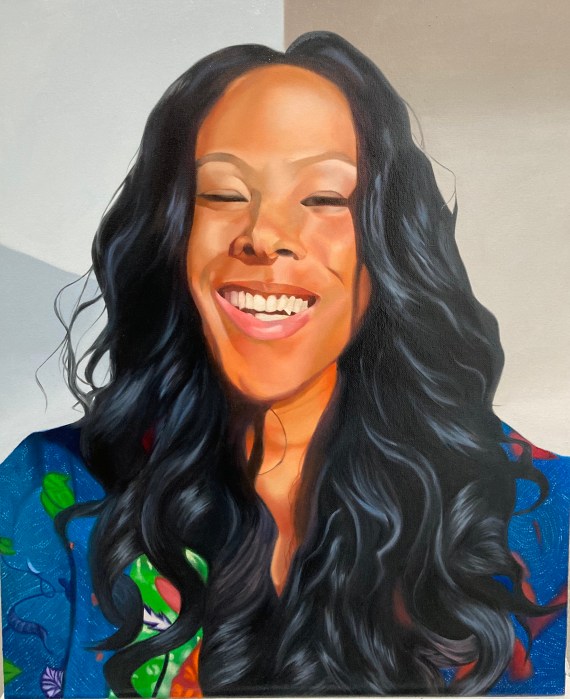“Little Shop of Horrors” has gone back to its roots, if you will, in a smashing, star-studded Off-Broadway revival, now planted at the Westside Theatre, that is easily the most gleefully entertaining show in New York right now.
With a cast that features Jonathan Groff, Christian Borle, and Tammy Blanchard under the direction of Michael Mayer, the production brings high Broadway style to the intimate 300-seat house. Mayer has moved away from the down-at-heels camp of the 1982 original and created a hilarious, Trump era fable of the wages of greed. If only people in real life had the level of questioning exhibited by Seymour Krelborn, the hapless Skid Row florist’s assistant, as he goes on a killing spree to feed the human-eating plant Audrey II that has made him rich and a star. Audrey II, by the way, also intends to take over the world. Put very simply, the metaphorical moral, as expressed in the last song, is “don’t feed the plants.” They may look innocent and entertaining, but it won’t end well.
Since it first arrived, “Little Shop…” with music by Alan Menken and book and lyrics by Howard Ashman has been a hit. Its winking perspective and satirical commentary on the aspirational nature of mid-1960s conformity — “there’s plastic on the furniture to keep it neat and clean” — is part of its charm, as is the doo-wop- and Motown-inspired score. Songs like “Suddenly Seymour” have been become cabaret and piano bar standards, and lyrics like “chang-a-lang, feel the ‘sturm und drang’ in the air” offer a sophistication that makes the show much more than simple parody. It is waggish Off-Broadway sensibility at its best — and it’s deliciously captured in this production.
Groff plays Seymour with absolute sincerity, subsuming his star quality in the character and making this well-meaning nebbish the heart of the piece. (Gideon Glick steps in for him November 5-17.) Seymour for all his tribulations has a strong moral compass. He loves his co-worker, Audrey, played to perfection by Blanchard, so much that he’ll kill for her. Well, not kill actually, but stand by as the evil dentist Orin Scrivello, who has physically abused Audrey, asphyxiates himself with nitrous oxide. “I can finish him with simple ‘laissez-faire,’” Seymour sings. Borle who plays Scrivello and a variety of other parts, is at his comic best here.
Tom Alan Robbins is terrific as Mushnik, the florist who has rescued Seymour from the streets and adopts him to protect the revenue Audrey 2 is generating. Audrey II, played by a series of puppets that grow from small to eventually dominating the stage, is voiced by Kingsley Leggs and brought to life by two unseen puppeteers. One of the more inspired elements of the show, however, has always been the three-girl group that provides commentary on the action — not to mention close harmony. Played by Ari Groover, Salome Smith, and Joy Woods, this trio hits the comedy and the music with unerring precision.
With a splendid set by Julian Crouch, costumes by Tom Broecker, and puppets by Nicholas Mahon, everything looks fabulous. Sound designer Jessica Paz deserves a special shout out for the intimate feeling she’s created. No one sounds amplified, which adds considerably to the production’s downtown vibe.
The tickets that remain for this show will run you more than $200, but for an evening so joyful, despite its heavy dose of dark satire, you might want to dig a little deep.
If you’re going to spend nearly three hours with a bunch of characters, by the end you want to feel you got to know them a little bit and the journey has been worth it. Particularly when the lead character is a mostly misanthropic anti-hero, the forces that create and drive him need to be explored rather than simply sketched.

Tracy Letts’ play “Linda Vista” takes on toxic masculinity, but it’s merely a series of set pieces that show the lead character Wheeler, a 50-year-old man, going through a contentious divorce feeling angry and misunderstood. He alternates between emotionally lashing out and sexual self-indulgence. But Wheeler is not sufficiently developed for us to empathize with him. As he wreaks havoc, his sodden solipsism casts a pall over virtually every encounter: he decimates his relationship with his wife and son, torches a potential relationship with Jules, a life coach, emotionally suffocates Minnie, an Asian rockabilly waif he tries to save, and manipulates Anita, a co-worker he tries to protect from their abusive boss. None of these characters is developed either, and the play simply rambles.
Wheeler doesn’t necessarily require redemption; in fact, his tragedy is that he may be beyond that. A series of expository scenes paint a picture of an angry man trying to find himself — but we see little discernible motivation. He demands attention but gives very little in return — to those he rolls over or to the audience.
It doesn’t help that this is territory that has been extensively and chillingly explored by Neil LaBute. Letts knows his way around a joke and bro-speak, enlivening the piece a bit. But scenes like when actress Ali McGraw’s sex addiction is discussed come off as forced and facile, never rising above bar banter. The graphic sex scenes, particularly the first one between Wheeler and Jules, raise issues never fully developed, so they become gratuitous. Insight into who these people are goes missing.
To be sure, the actors throw themselves into the fray. Ian Barford as Wheeler gives a largely solid performance. Though his default hangdog mode wears over time, Barford is consistently reaching for something, so we can see Wheeler’s internal conflict, even if it remains undefined. Cora Vander Broek as Jules is appealing, but her character is more a plot device than a real person. Similarly, Chantal Thuy as Minnie is an interesting actress lost in an undeveloped character.
“Linda Vista” asks more questions than it answers. Is this a study of depression? Is it an indictment of selfish men? Is it a meditation on the difficulties of relationships in the current world? Letts never clues us in, and director Dexter Bullard clearly lacks a vision for the piece. The play’s characters are as lost as the audience, and the theater’s exit provides the evening’s greatest satisfaction.
LITTLE SHOP OF HORRORS | Westside Theatre Upstairs, 407 W. 43rd St. | Through Jan. 19: Tue., Thu. at 7 p.m.; Wed., Fri.-Sat. at 8 p.m.; Wed., Sat. at 2 p.m.; Sun. at 3 p.m. | $69-$229 and up, with only premium seats currently available at telecharge.com or 212-239-6200 | In-person lottery 90 mins. before curtain at $29 in cash | Two hrs., 15 mins, with intermission
LINDA VISTA | Second Stage Theater | Helen Hayes Theatre, 240 W. 44th St. | Through Nov. 10: Tue., Thu. at 7 p.m.; Wed., Fri.-Sat. at 8 p.m.; Wed., Sat. at 2 p.m.; Sun. at 3 p.m. | $79-$199 at 2st.com or 212-541-5416 | Two hrs., 40 mins, with intermission



































